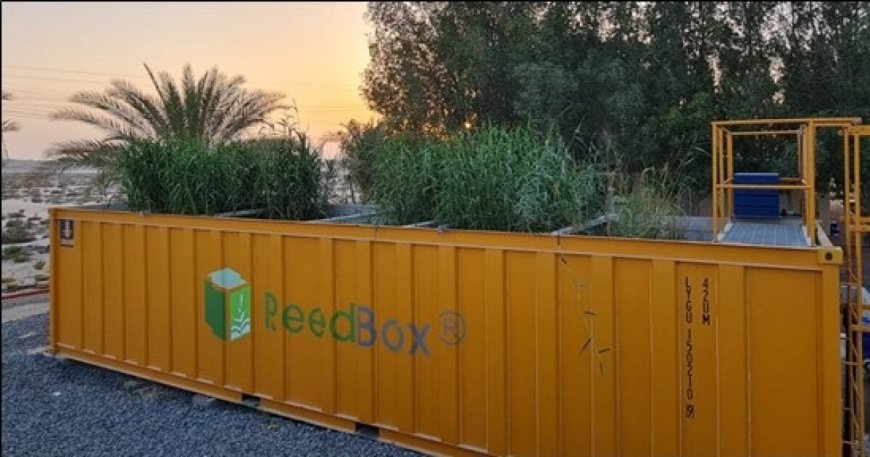Sustainable Treatment of Waste Water Generated by Oil and Gas Drilling Rig Camps
Sustainable Treatment of Waste Water Generated by Oil and Gas ... Society of Petroleum Engineers

The Role of Nature-Based Solutions in Sustainable Wastewater Treatment

The oil and gas industry produces varying forms of wastewater throughout the exploration, production, and processing chain. This article explores the use of nature-based solutions as an alternative to conventional treatment technologies in managing domestic wastewater generated in remote concession areas. By emphasizing the Sustainable Development Goals (SDGs), this report highlights the potential of nature-based solutions in promoting sustainability and economic benefits.
Conventional Treatment Technologies
Traditionally, oil and gas companies have relied on conventional treatment technologies, such as the activated sludge process, extended aeration, membrane bioreactors, and sequencing batch reactors, to manage the large volumes of domestic wastewater. These technologies are implemented either as centralized infrastructure solutions for larger permanent populations or as portable package plants for smaller camps involved in seismic exploration or well drilling activities. However, these mechanical processes can be vulnerable to variable loading and harsh operating conditions in remote locations, requiring close operation and maintenance attention.
Nature-Based Solutions
Nature-based solutions offer an alternative treatment approach with added sustainability and economic benefits. These solutions are characterized by their operational simplicity, robust performance, and minimized reliance on electromechanical equipment and chemical inputs. They provide a suitable treatment option for the oil and gas industry, which often operates in remote areas with limited wastewater treatment access.
Challenges in Remote Areas
Oil and gas exploration and production activities in remote areas pose challenges for mechanical treatment systems to comply with national effluent discharge standards. In such cases, it is industry practice to establish treatment facilities or transport wastewater long distances to municipal treatment facilities outside the concession areas. However, the remote setting and harsh operating conditions make it difficult for mechanical treatment systems to meet these standards consistently.
Testing and Performance Verification
To assess the feasibility of nature-based solutions in remote areas, a test unit was deployed to the Khalifa Industrial Zone Abu Dhabi in the United Arab Emirates. The treatment performance was tested for compliance with the Abu Dhabi Recycled Water and Biosolids Regulations for P1 Unrestricted Reuse. After a 26-week test period, a third-party performance verification confirmed that the test unit successfully treated the wastewater, producing effluent that fully complied with the regulations. This validation demonstrates that nature-based portable wastewater treatment systems offer a green alternative to operators and contractors.
Find paper SPE 211776 on OnePetro here.
SDGs, Targets, and Indicators
| SDGs | Targets | Indicators |
|---|---|---|
| SDG 6: Clean Water and Sanitation | 6.3: Improve water quality by reducing pollution, eliminating dumping, and minimizing release of hazardous chemicals and materials | – Compliance with national effluent discharge standards – Production of effluent in full compliance with Abu Dhabi Recycled Water and Biosolids Regulations for P1 Unrestricted Reuse |
| SDG 9: Industry, Innovation, and Infrastructure | 9.4: Upgrade infrastructure and retrofit industries to make them sustainable, with increased resource-use efficiency and greater adoption of clean and environmentally sound technologies and industrial processes | – Implementation of nature-based portable wastewater treatment system as a green alternative to mechanical treatment systems |
| SDG 12: Responsible Consumption and Production | 12.4: By 2020, achieve the environmentally sound management of chemicals and all wastes throughout their life cycle, in accordance with agreed international frameworks, and significantly reduce their release to air, water, and soil in order to minimize their adverse impacts on human health and the environment | – Adoption of nature-based solutions for wastewater treatment to minimize reliance on electromechanical equipment and chemical inputs |
1. Which SDGs are addressed or connected to the issues highlighted in the article?
The SDGs that are addressed or connected to the issues highlighted in the article are SDG 6: Clean Water and Sanitation, SDG 9: Industry, Innovation, and Infrastructure, and SDG 12: Responsible Consumption and Production.
2. What specific targets under those SDGs can be identified based on the article’s content?
Based on the article’s content, the specific targets that can be identified are:
- Target 6.3: Improve water quality by reducing pollution, eliminating dumping, and minimizing release of hazardous chemicals and materials
- Target 9.4: Upgrade infrastructure and retrofit industries to make them sustainable, with increased resource-use efficiency and greater adoption of clean and environmentally sound technologies and industrial processes
- Target 12.4: By 2020, achieve the environmentally sound management of chemicals and all wastes throughout their life cycle, in accordance with agreed international frameworks, and significantly reduce their release to air, water, and soil in order to minimize their adverse impacts on human health and the environment
3. Are there any indicators mentioned or implied in the article that can be used to measure progress towards the identified targets?
Yes, there are indicators mentioned or implied in the article that can be used to measure progress towards the identified targets:
- Compliance with national effluent discharge standards
- Production of effluent in full compliance with Abu Dhabi Recycled Water and Biosolids Regulations for P1 Unrestricted Reuse
- Implementation of nature-based portable wastewater treatment system as a green alternative to mechanical treatment systems
- Adoption of nature-based solutions for wastewater treatment to minimize reliance on electromechanical equipment and chemical inputs
Behold! This splendid article springs forth from the wellspring of knowledge, shaped by a wondrous proprietary AI technology that delved into a vast ocean of data, illuminating the path towards the Sustainable Development Goals. Remember that all rights are reserved by SDG Investors LLC, empowering us to champion progress together.
Source: jpt.spe.org

Join us, as fellow seekers of change, on a transformative journey at https://sdgtalks.ai/welcome, where you can become a member and actively contribute to shaping a brighter future.







